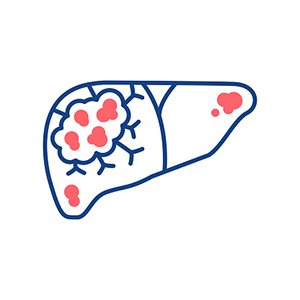In a systematic review and network meta-analysis of 14 trials reported in JAMA Oncology, Sonbol et al found that atezolizumab plus bevacizumab outperformed other regimens in the first-line treatment of advanced hepatocellular carcinoma and identified preferred treatments in refractory disease.
As stated by the investigators: “The treatment landscape for advanced hepatocellular carcinoma has recently changed and become relatively confusing. Head-to-head comparisons between most of the available agents have not been performed and are less likely to be examined in a prospective fashion in the future. Therefore, a network meta-analysis is helpful to compare different agents from across different trials.”

Photo credit: Getty
Study Details
The study involved database searches through March 2020 to identify phase III trials published in English that evaluated different VEGF inhibitors, immune checkpoint inhibitors, or their combinations in the first-line or refractory setting in advanced hepatocellular carcinoma. The primary outcomes of interest were overall survival and progression-free survival. An additional analysis was performed for overall and progression-free survival in patients with alpha-fetoprotein levels ≥ 400 ng/mL. In addition to hazard ratios (HRs) for outcomes of pairwise comparisons between regimens, P scores—which are frequentist analogs to surface under the cumulative ranking curve—were calculated to rank treatments, with a higher P score indicating better efficacy.
Overall, 14 trials were identified for inclusion, including 8 in the first-line setting and 6 in the second-line setting. One in the second line-setting was performed exclusively in patients with an AFP level ≥ 400 ng/mL; this trial was included in the AFP subgroup analysis alone, with the five other second-line trials included in the main analysis.
The eight trials in the first-line setting included a total of 6,290 patients. Among these trials, two compared sorafenib vs placebo and six compared VEGF tyrosine kinase inhibitors (linifanib, sunitinib, brivanib, and lenvatinib), nivolumab, or atezolizumab/bevacizumab vs sorafenib.
The five trials in the second-line analysis included a total of 2,653 patients; the trials compared VEGF tyrosine kinase inhibitors (cabozantinib, regorafenib, or brivanib), ramucirumab, or pembrolizumab vs placebo. In addition to the second-line trial comparing ramucirumab vs placebo in patients with AFP levels ≥ 400 ng/mL alone, three other second-line trials reported outcomes in subgroups of patients with AFP levels ≥ 400 ng/mL, with a total population of 1,084 included in the analysis. The three additional trials compared ramucirumab, regorafenib, or cabozantinib vs placebo.
First-Line Treatment
In the network meta-analysis, atezolizumab/bevacizumab exhibited a significant overall survival benefit compared with all other treatments, including lenvatinib (HR = 0.63, 95% confidence interval [CI] = 0.44–0.89), nivolumab (HR = 0.68, 95% CI = 0.48–0.98), sorafenib (HR = 0.58, 95% CI = 0.42–0.80), linifanib (HR = 0.55, 95% CI = 0.39–0.78), brivanib (HR = 0.54, 95% CI = 0.38–0.76), and sunitinib (HR = 0.45, 95% CI = 0.32–0.63).
Atezolizumab/bevacizumab exhibited a significant progression-free survival benefit vs sorafenib (HR = 0.59, 95% CI = 0.46–0.75), linifanib (HR = 0.73, 95% CI = 0.55–0.97), and sunitinib (HR = 0.52, 95% CI = 0.40–0.69). Lenvatinib exhibited a significant benefit vs sorafenib (HR = 0.66, 95% CI = 0.57–0.77) and sunitinib (HR = 0.58, 95% CI = 0.48–0.72). The hazard ratio for atezolizumab/bevacizumab vs lenvatinib was 0.89 (95% CI = 0.67–1.19). Overall, atezolizumab/bevacizumab ranked highest in efficacy for overall survival (P score = 99.65%) and progression-free survival (P score = 94.16%). Nivolumab ranked second in overall survival (P score = 81.55%), and lenvatinib ranked second in progression-free survival (P score = 79.71%).
KEY POINTS
- Atezolizumab/bevacizumab was the most effective regimen in the first-line setting.
- Regorafenib and cabozantinib appear to be preferred options in refractory patients.
Second-Line Treatment
In the refractory setting, regorafenib (HR = 0.46, 95% CI = 0.37–0.57), cabozantinib (HR = 0.44, 95% CI = 0.37–0.53), pembrolizumab (HR = 0.72, 95% CI = 0.57–0.90), and ramucirumab (HR = 0.62, 95% CI = 0.52–0.74) all exhibited a significant progression-free survival benefit vs placebo.
In addition, both cabozantinib (HR = 0.71, 95% CI = 0.55–0.92; HR = 0.61, 95% CI = 0.46–0.82) and regorafenib (HR = 0.74, 95% CI = 0.56–0.98; HR = 0.64, 95% CI = 0.47–0.87) exhibited a significant progression-free survival benefit vs ramucirumab and pembrolizumab, respectively. A significant overall survival benefit vs placebo was observed for only regorafenib (HR = 0.62, 95% CI = 0.51–0.75) and cabozantinib (HR = 0.76, 95% CI = 0.63–0.92).
Cabozantinib (P score = 90.45%) and regorafenib (P score = 83.93%) had the highest rankings for progression-free survival, and regorafenib (P score = 96.73%) and cabozantinib (P score = 66.2%) had the highest rankings for overall survival.
All study drugs—ie, regorafenib, cabozantinib, and ramucirumab—exhibited progression-free survival and overall survival benefits vs placebo. No significant differences in progression-free or overall survival were observed in comparisons between active drugs.
The investigators concluded: “This systematic review and network meta-analysis of 14 trials found that atezolizumab and bevacizumab in combination is now considered the standard of care in the first-line setting in patients with advanced hepatocellular carcinoma. Regorafenib and cabozantinib are preferred options in refractory patients, with ramucirumab as an additional option in those with levels of AFP of 400 ng/mL or higher. Future trials should focus on other potential combinations and best treatment strategy in patients with prior VEGF inhibitor/immune checkpoint inhibitor exposure.”
Tanios Bekaii-Saab, MD, of the Mayo Clinic College of Medicine and Science, Phoenix, is the corresponding author of the JAMA Oncology article.
Disclosure: For full disclosures of the study authors, visit jamanetwork.com.

